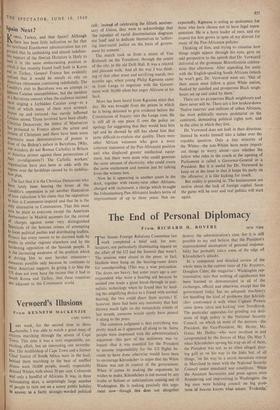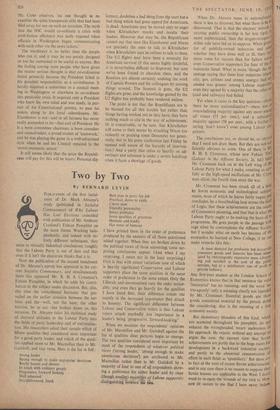The End of Personal Diplomacy
From RICHARD H. ROVERE NEW YORK Trr HE Senate Foreign Relations Committee last week completed a brief and, for non- Senators, not particularly illuminating inquest on the affair of the U2 and the Summit that wasn't. The sessions were closed to the press; in fact, blankets were hung on the hearing-room doors for soundproofing. (This was a wise precaution. The doors are heavy, but some years ago a cor- respondent who wore a hearing aid because he needed one made a great break-through in jour- nalistic technology when he found that by lend- ing the amplifying device to a friend with normal hearing, the two could share State secrets.) If, however, there had been any testimony that had thrown much light on the melancholy events of last month, someone would surely have passed it along to the press.
The common judgment is that everything was pretty much as it appeared all along to be. Some people were impressed with the administration's argument—this part of the testimony was re- leased—that it was essential for the President to assume responsibility for the U2 flights be- cause to have done otherwise would have been to encourage Khrushchev to argue that the White House was not in control of the government. When it comes to making the arguments he wishes to make, Khrushchev is not moved by any truths or fictions or anticipations coming out of Washington. He is making precisely this argu- ment now—though this does not altogether destroy the administration's case, for it is still possible to say and believe that the President's unprecedented assumption of personal responsi- bility has probably taken some of the edge off Khrushchev's attacks.
In a competent and detailed review of the whole mess in the current issue of The Reporter, Douglass Cater, the magazine's Washington rep- resentative, says that nothing of significance has been learned or demonstrated in all of the exchanges, official and otherwise, except that the government today has no adequate machinery for handling the kind of problems that Khrush- chev confronted it with when Captain Powers came down 'alive and kicking' over Sverdlovsk. The particular apparatus for grinding out deci- sions of high policy is the National Security Council, on which sit most of the persons—the President, the Vice-President, Mr. Herter, Mr. Gates, Mr. Dulles—who were involved in and compromised by the fiascos of May. On May 5, when Khrushchev sprung his trap on all of them, the President was not, as so often alleged, play- ing golf or on his way to. the links but, of all things, 'on his way to a secret mountain retreat in Maryland to meet with the National Security Council under simulated war conditions.' While the Assistant Secretaries and press agents were floundering and improvising in Washington, the big men were holding council on big prob- lems of heaven knows what nature.' 'Evidently,' .Mr. Cater ' observes, `no one thought to re- examine the quite transparent alibi that had been filed away for use on such an occasion. The myth that the NSC would co-ordinate a crisis with push-button efficiency was sadly exposed when officials in Washington began communicating with each other via the news tickers.'
The machinery is no better than the people who run it, and it may be too poorly designed or too far outmoded to be useful to anyone. But the feeling among most people who have given the matter serious thought is that co-ordination failed primarily because the President failed in his personal responsibility as a co-ordinator. It hardly required a committee or a council meet- ing in Washington or elsewhere to co-ordinate this particular crisis. It required only a President who knew his own mind and was ready, in pur- suit of his Constitutional powers, to pass his orders along to his loyal subordinates. Mr. Eisenhower is not—and in all fairness has never really pretended to be—that sort of President. He is a born committee chairman, a born consulter and council-taker, a proud exalter of 'teamwork,' and he was playing the game in a well-advertised style when he and his Council repaired to the 'secret mountain L'etreat ' It still seems likely that the price the Republi- cans will pay for this will be heavy. Personal dip- lomacy, doubtless a bad thing from tke start but a bad thing which had great appeal for Americans, is dead. Americans may be moved only to anger when Khrushchev mocks and insults their leaders. However that may be, the Republicans cannot say that men like Eisenhower and Nixon are precisely the ones to talk to Khrushchev when Khrushchev says he refuses to talk to them. The U2 flights may have been a necessity for American survival (if this seems highly doubtful, it is nevertheless difficult to disprove), but now we've been forced to abandon them, and the Russians are almost certainly undoing the work of Captain Powers and his colleagues by moving things around. The Summit is gone, the U2 flights are gone, and the knowledge gained by the U2 flights has probably been rendered useless.
The point is not that the Republicans are to be blamed for all this trouble but rather that, things having worked out as they have, they have nothing much to cite in the way of achievement. (It is conceivable, to be sure, that Khrushchev will come to their rescue by attacking Nixon too violently or praising some Democrat too gener- ously, but in his press conference last Friday he seemed well aware of the hazards of interven- tion.) And a party that relies so heavily on ad- vertisers and salesmen is under a severe handicap when it faces a shortage of goods.











































 Previous page
Previous page